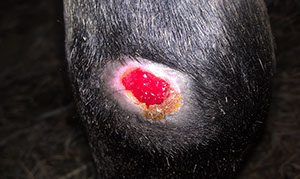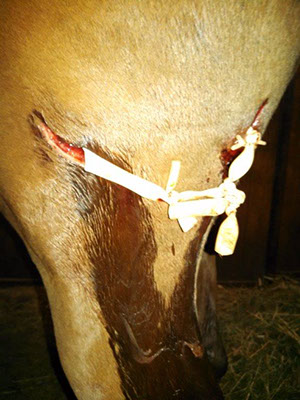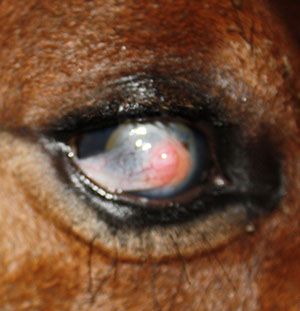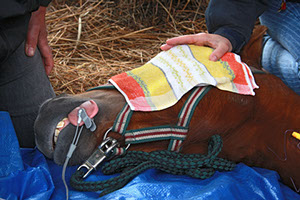Claims
If you have a claim or suspect a possible claim, it is very important to follow the proper steps to make sure your insurance coverage is put into effect. All insurance policies include 800 numbers for you to contact an adjuster and submit a claim. Be sure you locate this information in your policy when it is received so you know who to call in the event of an emergency or if it is after hours and you cannot reach our office. During office hours you can feel free to contact us and we will be happy to submit a claim for you. Below is a general guideline on horse and farm or liability claims.
Horse Mortality Claims
Please take note of the 24-hour emergency claim number that is included in your policy and be certain that all people responsible for the horse(s) have this available to them. Failure to “promptly” report an illness, surgery, injury or disease may cause your claim to be denied. A recent court case defined “prompt” as 14 days.
During office hours you can contact us or to speed up your claim and for after hour emergencies you should contact the specific claim representative at the 800# located in your policy. Please try to have the following information available when calling.
- Policy Number
- Name of Horse
- Nature of Loss
- Date of Loss
- Name and contact information for the attending veterinarian
- Insured’s name and contact information
If the horse is deceased, you are responsible for obtaining a necropsy to determine the cause of death.
The best way to hasten the time between a loss and a payment is to give the company adjuster a prompt response to all requests for specific items or further details. In addition, a quick response from the attending veterinarian including forms or documents needed by the claims adjuster is very helpful in expediting a claim.
Basic Guidelines for Animal and Equine Claims Information:
- If you need to call a veterinarian to examine or treat your horse, report the incident at once.
- Permission for elective surgery (such as castration) must be obtained in advance. Charges may apply, so contact our office to add coverage to your policy prior to the surgery.
- Emergency surgery (to save the life of the animal) can proceed on the advice of your veterinarian if there is not time to call the company claims adjuster. In this case, notify the adjustor as soon as possible.
- Permission must be obtained to euthanize an animal. If it is an emergency situation, consent is not required if the attending veterinarian states that immediate euthanasia is necessary to prevent inhumane suffering.
- An autopsy and post mortem examination at the owner’s expense must be obtained.
Common Reasons For Denied Mortality Insurance Claims
No insurance agent likes to tell a customer their insurance claim will be denied. It is helpful to understand your policy and know your duties in the event of a loss so that your claim is not denied. Here are the Top 5 reasons claims are denied.
- THE CLAIM IS TURNED IN AFTER THE POLICY HAS EXPIRED. These policies clearly state that that for coverage to apply, the claim must be called in before the policy expiration date.
- THE CLAIM IS SUBMITTED TOO LATE. All companies require “immediate” notice if a horse is sick or injured. Now think about the definition of the word “immediate”. How do you define it? In a recent court case (RICHARD HAUSER, Plaintiff, v. GREAT AMERICAN ASSURANCE COMPANY, Defendant) the court stated the word “immediate” means without the loss of time. This claim was denied for several reasons but the take home message was it took 15 days for him to submit the claim to the insurance adjuster and he failed to notify them the horse had received prior treatments. Even if an issue seems minor at the time, if it has the potential to become a bigger problem, call it in. Trying to get initial diagnostics and treatment covered months after an injury or illness may result in a denial of coverage.
- READ YOUR POLICY AND KNOW WHAT IS COVERED BEFORE MAKING DECISIONS ON TREATING YOUR HORSE. Major Medical provisions usually exclude birth defects, congenital conditions, corrective treatment for contracted tendons or club foot, umbilical hernia’s, alternative treatments such as chiropractic, massage, acupuncture, blanket therapy, laser therapy, corrective shoeing, therapeutic shoeing and others. Don’t give the vet a green light to do anything and everything and then be surprised when coverage for certain treatments are denied. Coverage for joint injections often varies by company as well. Most will not provide any coverage for joint injections, but some will allow coverage if it is done as a result of trauma related injuries. However, the majority of companies do provide cover shockwave, IRAP and PRP treatments. Be aware that some policies also have waiting periods, coinsurance and sub-limits for these treatments.
- EXPERIMENTAL TREATMENTS ARE NOT COVERED, NOR ARE UNPROVEN USES OF MAINSTREAM TREATMENTS. Most policies cover stem cell when used appropriately. But, it could be denied if you are attempting to treat EPM. Same for Tildren, it is proven for use on issues involving bone. It is not a proven treatment for soft tissue injuries. It will generally be covered for pedal osteitis and navicular issue (bone). Coverage could be denied for use on a suspensory injury (soft tissue). The exception might be if the suspensory involves an avulsion fracture as then there is a boney component. Always check with your vet and the insurance adjuster to make sure the treatment chosen for the condition matches the approved uses for that treatment or coverage could be denied.
- CLAIMS ARE DENIED DUE TO PRE-EXISTING CONDITIONS. This is a big one! Yes, you may have exclusions but you will know exactly what will be covered under your policy up front. During a claim, it is extremely rare that information showing the condition to be pre-existing doesn’t come to light somehow. You will have proceeded with treatment expecting coverage only to have it denied for being pre-existing. It is important to understand that unlike our human health insurance, horse insurance policies are re-underwritten every year. New conditions will most likely be excluded, but if you followed your policy guidelines and reported it in a timely manner, some policies will provide an extension on eligible conditions for up to one year after the expiration date while other policies limit it to 30 days past the expiration date. During a recent AgBusiness conference I attended there was some discussion about a database that has been started so all claims can be tracked on insured horses. This is useful when horses are sold as new owners are often not aware of pre-existing conditions when they purchase a horse. I have had the unfortunate job of telling people about prior surgeries and lameness issues involving newly acquired horses simply because there are very few mortality insurance companies in the country and I work with the majority of them, so if I submit an application on a horse and it has been insured previously, there is a good chance I’ll find out if there have been prior health issues.
Auto, Property and/or Liability Claims:
For claims concerning your Auto, Property or Equipment, immediately secure the property so no further damage will occur. For liability claims, gather all the specific accident facts and notify our office or contact the adjuster directly. The 800# for emergency claims is located in your policy.
DO
- Obtain all accident details.
- Obtain names, addresses, and phone numbers of all witnesses.
- Obtain names, addresses, and phone numbers of police, fire, medical or hospital authorities.
- Call and report any incidents to your insurance carrier’s Claims Department.
- Use your cell phone or a camera to take any pictures that might be helpful.
- Make written notes as soon as possible and/or prepare a diagram.
- In case of a theft, a police report will be required.
DON’T
- Divulge information with regard to your liability limits.
- Admit responsibility for the accident or injury.
- Discuss accident or injury details with anyone other than your authorized insurance representative.
Workers Compensation:
A first report of injury form must be completed and submitted to the insurance carrier. This form is included in your workers compensation policy. If you need another copy, contact our office and we will send one to you. In general, filing this form is not an admission of liability. You must report a claim to your insurer whenever anyone believes that a work-related injury or illness that requires medical care or where lost time from work has occurred. If the claimed injury wholly or partially incapacitates the employee for more than three calendar days, the claim must be made on this form and reported to your insurer within ten days. Your insurer may require you to file it sooner. Failure to file within the ten days may result in penalties. It is important to file this form quickly to allow your insurer time to investigate the claim. Your insurer will report the injury to the Department of Labor and Industry (Department), when necessary. Self-insured employers have 14 days to report the injury to the Department, when necessary.
If the claim involves death or serious injury (including injuries that later result in death), you must notify the Department of Labor and your insurer within 48 hours of the occurrence.
DISCLAIMER: Please note the above information is intended to be used as a guide only and these statements do not change or alter the actual terms or conditions of your policies. You are solely responsible for reading your policies and understanding your policy conditions in order to be in compliance with your and state insurance guidelines, rules and regulations.






